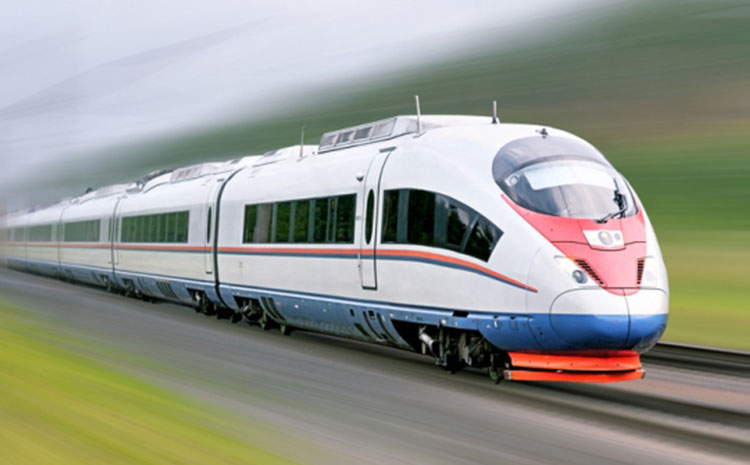
INFRASTRUCTURE
INFRASTRUCTURE PLANS PRIORITISED
The government is racing to set the massive transport projects into motion before the tentative November general election
With Prime Minister Prayut Chan-o-cha pledging to call a general election some time in 2018 between September and December, the government is likely to be busy revving up the
development of myriad big-ticket infrastructure projects.
The Transport Ministry’s infrastructure development plan calls for ongoing development projects estimated at a combined 103 billion baht in fiscal 2018.
The projects are mainly light rail tracks in key provinces like Phuket, Chiang Mai, Nakhon Ratchasima and Khon Kaen.
Similar rail projects in Phitsanulok and Udon Thani, the intercity motorway linking Bangkok and Mahachai in Samut Sakhon, the improvement of two airports in Khon Kaen and Krabi,
and a dry port development in Khon Kaen are likely to be proposed for development in 2018.
The public-private partnership (PPP) programme will be applied to investment in the four light rail projects, said Transport Minister Arkhom Termpitayapaisith.
“The government is hopeful that construction of the first four light rail projects in the provinces will be implemented in 2018 to reduce traffic congestion in those cities,” Mr Arkhom said.
A feasibility study of Phuket’s light rail project has been completed.
The study showed that the 60-kilometre light rail will require an estimated budget of 24 billion baht, covering 23 stations. The rail route will link Tha Nun in Phangnga province to Phuket
airport and the inner city.
Chiang Mai University has also completed a study of the Chiang Mai light rail development and proposed two options: 35km of the “A” route or 40.57km of the “B” route.
The A route includes three lines: the 12km Red Line, the 11km Green Line and the 12km Blue Line. The route would run both above and below ground, with a total investment of 107 billion baht.
The B route, meanwhile, comprises the 15.65km Red Line, the 11.11km Green Line, and the 13.81km Blue Line. The project would be built on land, with an investment cost of 28.9 billion baht.
The Khon Kaen light rail project is undergoing an environmental impact assessment.
The rail network will have 18 stops, spanning 22.6km. The current plan aims to make island platforms for trains on Mittraphap Road, running from the Tha Phra locality to the Samran locality
in Khon Kaen’s Muang district.
The project’s value is estimated at 15 billion baht, and the public and private sectors in the province are committed to jointly investing in the project.
A design for Nakhon Ratchasima’s light rail project worth an estimated 15 billion baht by the Office of Transport and Traffic Policy and Planning has also been completed.
Porametee Vimolsiri, secretary-general of the National Economic and Social Development Board (NESDB), said the new infrastructure projects and the government investment will build investor
confidence and maintain the country’s economic growth momentum in the years to come.
Over the past few years, the Prayut government has mapped out a number of new infrastructure projects, from motorways and mass transit to a double-track rail network, as well as airport expansions.
The 2016 transport infrastructure action plan (urgent phase) called for 21 priority projects with a total investment value of 1.83 trillion baht, while the 2017 plan calls for the investment of 34
infrastructure projects worth a combined 895.75 billion baht.
According to the NESDB report, 10 of the planned 21 projects outlined in the fiscal 2016 plan are under construction, one is in the process of acquiring cabinet approval, and five are about to
start construction after the cabinet recently approved the winning contractors.
Other projects include the Thai-Chinese high speed railway project, the Bangkok-Hua Hin and Bangkok-Rayong highspeed rail projects, and the Thai-Japanese high-speed train linking Bangkok
and Chiang Mai.
Workers began clearing space for the construction of the initial 3.5km stretch of the Thai-Chinese high-speed railway from Bangkok to Nakhon Ratchasima on Dec 21, while the Bangkok-Hua Hin
and Bangkok-Rayong high-speed rail projects are in the process of being presented to the public-private partnership committee for approval.
For the Thai-Japan high-speed train development, Japan has concluded its study of the Bangkok-Chiang Mai Shinkansen-like bullet train, estimating investment cost to be as high as 420 billion
baht and fares of just over 1,000 baht a trip.
The NESDB said of the 34 infrastructure projects worth 895.75 billion baht scheduled for investment in 2017, one project is operational, two are under construction and one is in the bidding process.
Two projects are being prepared to be bid upon, 13 projects are in the process of requesting cabinet approval, 10 are being proposed to the PPP committee, and five are being studied for feasibility.
Mr Porametee said the construction of infrastructure projects in 2018 will become a vital contributor to the economy.
The NESDB predicts that government investment will rise by 11.8% in 2018, up from 9.9% in 2016 and 1.8% forecast for 2017.
He said the government’s investment and infrastructure development and the EEC will create investor confidence and keep up the momentum of economic growth.
“If the government achieves its goals for the infrastructure projects as planned, private investment is expected to expand accordingly,” Mr Porametee said.
The NESDB expects 3.7% growth in private investment for 2018, up from 0.4% in 2016 and 2.2% forecast for 2017.
The board forecasts GDP growth of 3.6-4.6% for 2018, up from its estimate of 3.9% growth for 2017 and actual 3.2% in 2016.
Growth will be supported by the global economic recovery; the acceleration of public investment, which will be supported by key investment projects and a higher capital budget framework; improving
trends in private investment; and the continued expansion of key production sectors, the NESDB said.
Improvement i n employment and household income conditions is also anticipated in 2018.
The value of exports is predicted to expand by 5%.
Private consumption and total investment are forecast to grow by 3.1% and 5.5%, respectively.
The government achieves its goals for the infrastructure projects as planned, private investment is expected to expand accordingly. PORAMETEE VIMOLSIRI Secretary-general, NESDB




